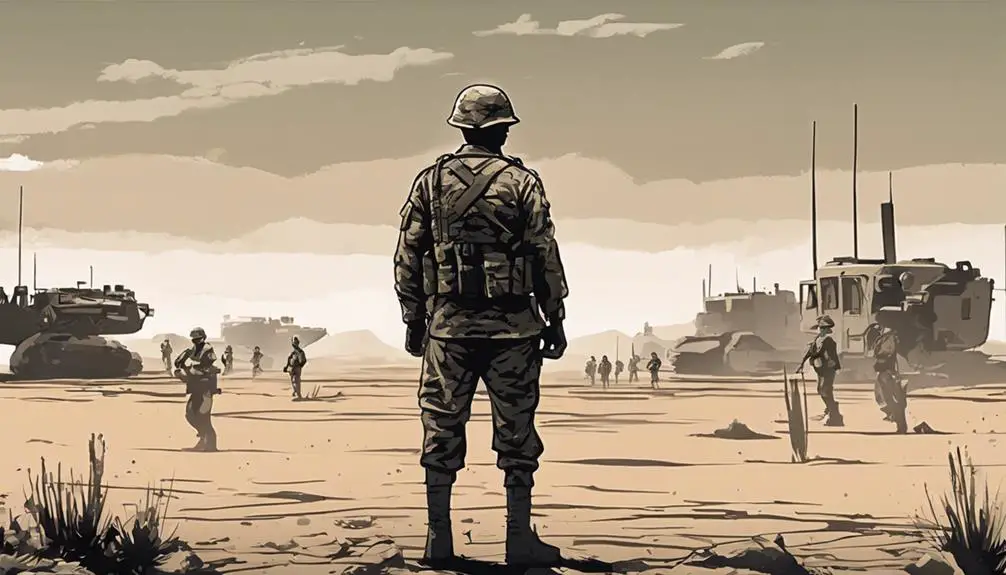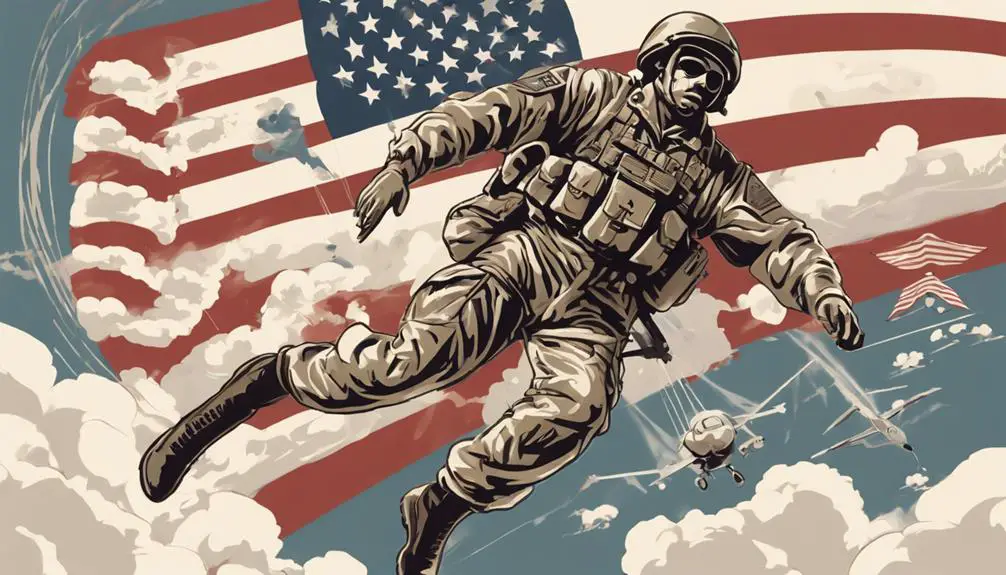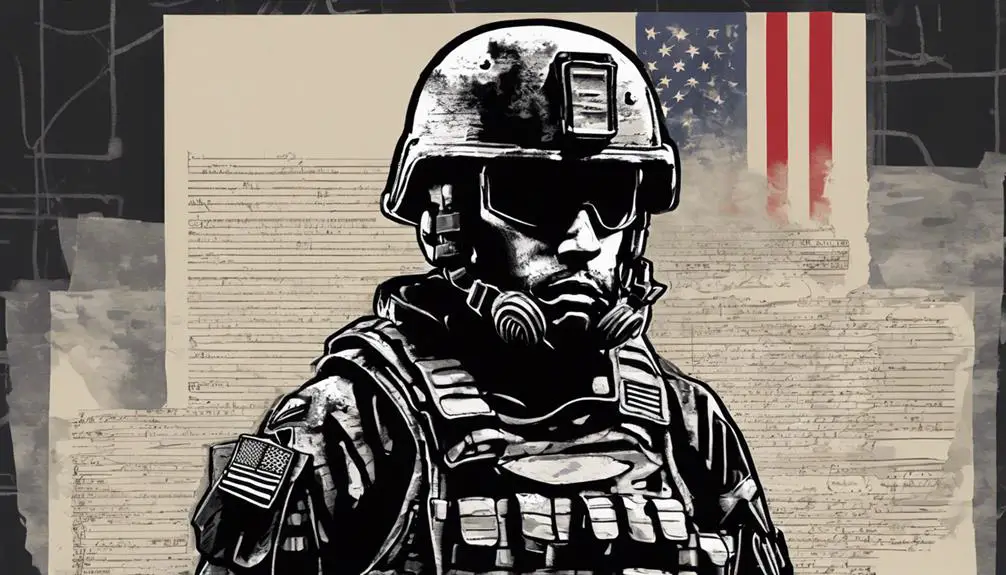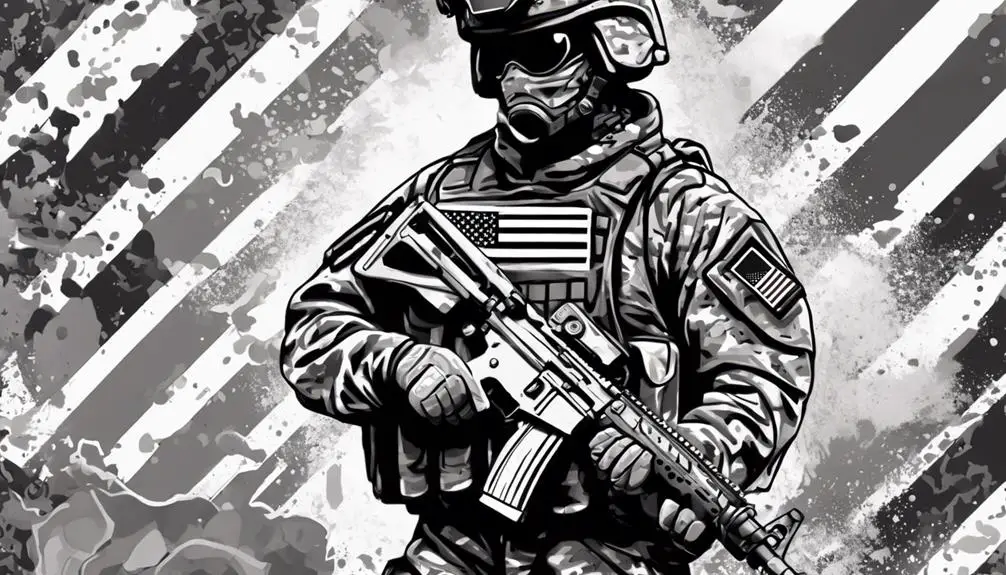You're about to discover the coolest military slang, from "FNG" (that's "Freaking New Guy") to "OSUT" (One Station Unit Training). But that's just the beginning – naval slang like "deck", "head", and "scuttlebutt" will have you sounding like a seasoned sailor. Airborne jargon like "bandits" and "DZ" will get you flying high, while combat humor will have you laughing like a pro. And don't even get started on code names and nicknames like "Maverick" and "Spartan". Buckle up, because you're about to get schooled in the most tubular military lingo out there – and that's just the start of your top-secret briefing.
From Boot Camp to Battle

As you trade in your civvies for camouflage, you'll quickly discover that military slang is an essential tool for maneuvering the journey from boot camp to battle. From the get-go, Drill Instructors (DIs) will drill into your head the importance of speaking the military language.
In Basic Training, you'll learn to ditch civilian slang and adopt a new dialect that's concise, clear, and combat-ready. DIs will teach you to swap 'hello' for 'hooah' and 'goodbye' for 'later, gator.' You'll learn to call your fellow recruits 'battle buddies' and your superiors 'brass.'
You'll even pick up acronyms like 'FNG' (freaking new guy) and 'OSUT' (one-station unit training). Mastering military slang is key to fitting in and staying ahead of the game. So, pay attention and repeat after your DI: 'Hooah, Sergeant!'
Slang of the Sea Services
You're about to set sail into a linguistic sea change, where 'deck' refers to the floor, 'head' is the bathroom, and 'scuttlebutt' is the gossip. Welcome to the world of Naval slang, where 'sailors' have their own unique lingo.
Naval Nicknames are a staple of sea service culture, with 'squid' referring to a sailor, 'shellback' for those who've crossed the equator, and 'boot' for a newbie. You might even hear a 'sea shanty' or two, traditional sailor songs sung while working on deck.
In the Navy, 'chow' is food, 'rack' is bed, and 'liberty' means freedom – as in, time off. Don't get 'keelhauled' (in trouble) or you might find yourself 'swabbing the decks' (cleaning).
If someone says 'anchors aweigh', they're saying it's time to get moving. You might even hear 'fair winds and following seas' as a way of saying goodbye. So, grab your 'sea legs' and get ready to navigate the world of Naval slang!
Airborne Lingo and Jargon

Flying high in the world of airborne operations, you'll need to decode the cryptic language of pilots and aircrew. 'Bandits' are enemy aircraft, and 'bogies' are unidentified planes. As you navigate the world of airborne lingo, you'll encounter a unique dialect that's equal parts functional and colorful.
Paratrooper phrases are peppered with terms like 'stick' (a group of paratroopers) and 'DZ' (drop zone). Meanwhile, skydiver slang is all about precision, with terms like 'exit' (leaving the aircraft) and 'deployment' (opening the parachute).
But airborne lingo isn't just about technical terms – it's also steeped in tradition and camaraderie. Pilots and aircrew use phrases like 'roger that' (understood) and 'wilco' (will comply) to communicate quickly and efficiently.
When they're not flying high, they're swapping stories and jokes that are equal parts irreverent and hilarious. So buckle up, because in the world of airborne operations, language is just as important as lift-off.
Battlefield Banter and Jokes
In the trenches, where bullets fly and humor's a coping mechanism, you'll find battle-hardened troops trading wisecracks and jokes to keep morale high and fear at bay. Combat humor is a unique brand of gallows humor that helps soldiers cope with the harsh realities of war. It's a way to poke fun at the absurdity of their situation, and War Wit becomes an invaluable currency in the trenches.
You'll hear jokes about everything from the ridiculousness of military bureaucracy to the absurdity of their living conditions. Troops will crack jokes about the chow, the weather, and even the enemy. It's all about finding the humor in the chaos and keeping spirits high. Laughter becomes a powerful tool in the face of adversity, and these jokes and one-liners become an essential part of the military culture.
War Wit is all about finding the humor in the darkest of situations, and it's a crucial part of what gets soldiers through the tough times. So, the next time you're facing a tough situation, remember the troops who've been there, done that, and still managed to find the funny side.
Code Names and Nicknames

Code names and nicknames have become an integral part of military lingo, allowing troops to quickly identify and communicate complex information in high-stress situations. You might've heard of Operation Overlord, the codename for the Allied invasion of Normandy during World War II. Or maybe you're familiar with 'Maverick,' the call sign of a skilled fighter pilot. These code names and nicknames serve as shortcuts, simplifying communication and reducing confusion.
Here are a few examples:
- Operation Names: Like Operation Desert Storm, which refers to the 1991 Gulf War, or Operation Neptune Spear, the raid that took down Osama bin Laden.
- Alias Identities: Think 'Spartan' for a special forces operative or 'Raven' for a stealthy reconnaissance expert.
- Radio Call Signs: 'Hawk' for a helicopter pilot or 'Viper' for a fighter jet squadron.
These code names and nicknames are more than just cool labels – they're essential tools for effective communication in high-pressure situations. By using them, military personnel can quickly convey complex information, making all the difference in the heat of battle.
Declassified Military Acronyms
Your military career is about to get a whole lot more efficient with the mastery of declassified military acronyms, shorthand essentials that save time and lives on the battlefield. These cryptic abbreviations might seem like a secret language, but understanding them is essential for effective communication.
So, where do these acronyms come from? The origins of military acronyms date back to World War I, when radios were first used to transmit messages. To avoid enemy interception, messages were shortened into code-like abbreviations. Today, acronyms are used to convey complex information quickly, from SOP (Standard Operating Procedure) to EOD (Explosive Ordnance Disposal).
But what about classified abbreviations? Those remain, well, classified. What we can tell you is that they're used to conceal sensitive information from unauthorized eyes. Think of them as a secret handshake, but instead of a handshake, it's a cryptic message that only those with clearance can decipher.
Mastering declassified military acronyms will get you one step closer to being a seasoned pro, but don't worry, we won't leave you hanging – we'll decode the most essential ones for you.
Frequently Asked Questions
Can Civilians Use Military Slang in Everyday Conversation?
You're wondering if you can casually drop military slang into everyday conversations. Here's the deal: while it might seem cool, it's crucial to take into account cultural appropriation.
Without a genuine connection to the military, using their lingo can come across as insensitive. Mastering conversational nuance is key; understand the context and history behind the terms before tossing them around.
Use them thoughtfully, and you'll avoid being 'dismissed' from the conversation.
Are Military Slang Terms Universal Across All Countries?
You're wondering if military slang terms are universal across all countries. Well, not quite. While some terms might be adopted globally, cross-cultural variations and international nuances come into play.
Different countries have their own unique slang, shaped by their distinct military cultures and languages. So, what's 'cool' in the US mightn't be the same in, say, Japan or Brazil.
Be prepared to learn new lingo if you're working with international forces!
Do Military Officers Use Slang More Than Enlisted Personnel?
'Get straight to the point' – let's delve into the question. Do military officers use slang more than enlisted personnel?
The answer lies in officer camaraderie and rank distinction. Officers, being part of a tighter-knit community, tend to develop their own lingo, bonding over shared experiences.
Enlisted personnel, on the other hand, have more diverse backgrounds, making their slang more varied.
It's not a question of who uses slang more, but rather how it's used to foster unity within each group.
Can Military Slang Be Used in Formal Writing or Reports?
When writing formal reports, you'll want to stick to a professional tone. You shouldn't use slang, even if it's military slang, as it can come across as unprofessional.
Instead, opt for a formal tone and language that's clear and concise. Your writing should be polished and free of colloquialisms.
Are There Any Military Slang Terms That Are No Longer Used?
You're probably wondering if some military slang terms have bitten the dust. The answer is yes, many have become obsolete phrases, forgotten in the annals of time.
As language evolves, old lingo falls out of favor, replaced by newer, trendier expressions. Forgotten terms like 'GI' (Government Issue) or 'foxhole' (a defensive position) are now relics of the past.
You won't hear these terms in modern military chatter, but they're still interesting to know.
Conclusion
You've made it through the trenches of military slang, and congrats, you're still standing! But let's be real, you're probably more confused than a civilian at a military briefing. Don't worry, it's not like you're going AWOL or anything.
You've just got a bad case of 'FNG-itis' (that's 'Freaking New Guy' for the uninitiated). Just remember, in the immortal words of the military: 'HUA' ( Heard, Understood, Acknowledged).
Now go forth and sling some military slang like a boss!







